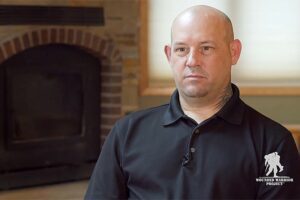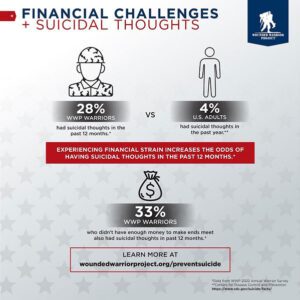Wounded Warrior Project spotlighted the alarming prevalence of suicidal thoughts among veterans who are struggling economically. The findings underscore the importance of resources that help military veterans become self-sufficient and provide for themselves and their families.
 “Addressing my PTSD was hard enough, but worrying about how to put food on the table next week for my family left me thinking, ‘Why am I doing this?’ I am thankful to Wounded Warrior Project for getting behind me and investing in my recovery,” said Phil Krabbe, a former Marine who nearly completed suicide in 2020 but found support from WWP through peer connections and help with his VA benefits.
“Addressing my PTSD was hard enough, but worrying about how to put food on the table next week for my family left me thinking, ‘Why am I doing this?’ I am thankful to Wounded Warrior Project for getting behind me and investing in my recovery,” said Phil Krabbe, a former Marine who nearly completed suicide in 2020 but found support from WWP through peer connections and help with his VA benefits.
Each year, WWP conducts a survey of the injured, ill, and wounded veterans currently registered with the organization. According to the 2022 Annual Warrior Survey:
- Overall, more than 1 in 4 WWP warriors considered suicide in the past year.
- One in 3 WWP warriors who struggled financially in the past year had thoughts of suicide. Rates are even higher among those facing food insecurity. This is concerning, given the survey notes 64% of WWP warriors struggled to make ends meet at some point in the last 12 months.
How to Prevent Veteran Suicide: Phil’s Story
The Centers for Disease Control and Prevention lists “strengthened economic support” as a suicide prevention resource, but it’s not the only ingredient. It also lists “healthy connections,” like the friend Phil made at his first WWP event.
“I was about to pull the trigger, but my eyes caught the word ‘courage’ tattooed on my hand. I had gotten it to honor Ray Pizarro, a fellow warrior who had coached me on what to do if suicidal thoughts crept in. I had promised him I’d have the courage to survive,” said Phil, who put down the gun and drove to a hospital.
Phil achieved economic stability by seeking help from WWP with his VA benefits. WWP also provides financial education, career readiness training, and access to leading national employers.
 “Money alone is often not enough to address veterans’ psychological needs,” explained Erin Fletcher, Psy.D., WWP director of Warrior Care Network®. “They want purpose and camaraderie, and many seek a new and meaningful career post-military service. WWP helps with each of these, knowing they can help protect against suicidal thoughts.”
“Money alone is often not enough to address veterans’ psychological needs,” explained Erin Fletcher, Psy.D., WWP director of Warrior Care Network®. “They want purpose and camaraderie, and many seek a new and meaningful career post-military service. WWP helps with each of these, knowing they can help protect against suicidal thoughts.”
Phil’s sense of purpose became clear: carry on the legacy of the man who saved his life. Ray passed away, but Phil has followed in his footsteps to become a peer leader. He shares his suicide story so others will have the courage to survive.
Visit Wounded Warrior Project for more information about its efforts to address veteran suicide and mental health.


